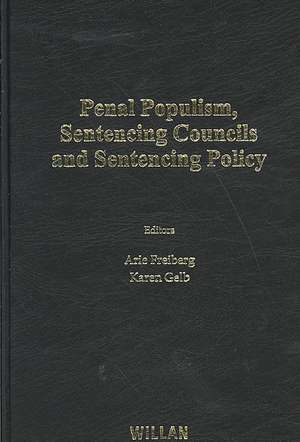Penal Populism, Sentencing Councils and Sentencing Policy
Editat de Arie Freiberg, Karen Gelben Limba Engleză Hardback – feb 2008
Penal Populism presents theoretical perspectives on the role of the public in the development of sentencing policy. It places particular emphasis on the emerging role of sentencing commissions, advisory councils or panels in a number of English speaking countries: Australia, New Zealand, the United States, the United Kingdom, Scotland and South Africa.
The book explains, expands and develops the existing literature that looks at public attitudes to justice and the role that the 'public' can play in influencing policy. Written in a scholarly yet accessible style, Penal Populism asks the critical questions: should 'public opinion', or preferably, 'public judgment' be relevant to court decision-making, to institutional decision-making and to the political process? And if so, how?
Preț: 600.38 lei
Preț vechi: 840.88 lei
-29% Nou
Puncte Express: 901
Preț estimativ în valută:
114.88€ • 125.18$ • 96.81£
114.88€ • 125.18$ • 96.81£
Carte tipărită la comandă
Livrare economică 23 aprilie-07 mai
Preluare comenzi: 021 569.72.76
Specificații
ISBN-13: 9781843922780
ISBN-10: 1843922789
Pagini: 256
Dimensiuni: 138 x 216 x 20 mm
Greutate: 0.63 kg
Ediția:1
Editura: Taylor & Francis
Colecția Willan
Locul publicării:Oxford, United Kingdom
ISBN-10: 1843922789
Pagini: 256
Dimensiuni: 138 x 216 x 20 mm
Greutate: 0.63 kg
Ediția:1
Editura: Taylor & Francis
Colecția Willan
Locul publicării:Oxford, United Kingdom
Cuprins
1. Penal Populism: Sentencing Councils and Sentencing Policy 2. Sentencing Policy and Practice: The Evolving Role of Public Opinion 3. Penal Populism and Penal Scandal in New Zealand 4. Dealing the Public In: Challenges for a Transparent and Accountable Sentencing Policy 5. Myths and Misconceptions: Public Opinion Versus Public Judgment About Sentencing 6. The Role of the Public in Sentencing Policy Development under the Minnesota Sentencing Guidelines 7. The Failures of the United States Sentencing Commission 8. English Sentencing Guidelines in their Public and Political Context 9. The New South Wales Sentencing Council 10. The Sentencing Commission for Scotland 11. The Victorian Sentencing Advisory Council: Incorporating Community Views into the Sentencing Process 12. A Perspective on the Work of the Victorian Sentencing Advisory Council and its Potential to Promote Respect and Equality for Women 13. Sentencing Reform in New Zealand: A Proposal to Establish a Sentencing Council 14. Proposals for a Sentencing Council in South Africa 15. A Federal Sentencing Council for Australia 16. Institutional Mechanisms for Incorporating the Public in the Development of Sentencing Policy 17. Does it Matter? Reflections on the Effectiveness of Institutionalised Public Participation in the Development of Sentencing Policy
Notă biografică
Arie Freiberg is Chair of the Victorian Sentencing Advisory Council and is the current Dean of Law at Monash University, following ten years as the Foundation Chair of Criminology at the University of Melbourne.
Karen Gelb obtained her doctorate in Criminology from New York University and is currently the Senior Criminologist for the Sentencing Advisory Council in Victoria, Australia. She spent five years at the National Centre for Crime and Justice Statistics, part of the Australian Bureau of Statistics.
Karen Gelb obtained her doctorate in Criminology from New York University and is currently the Senior Criminologist for the Sentencing Advisory Council in Victoria, Australia. She spent five years at the National Centre for Crime and Justice Statistics, part of the Australian Bureau of Statistics.
Descriere
The book explains, expands and develops the existing literature that looks at public attitudes to justice and the role that the 'public' can play in influencing policy. Written in a scholarly yet accessible style, Penal Populism asks the critical questions: should 'public opinion', or preferably, 'public judgment' be relevant to court decision-making, to institutional decision-making and to the political process? And if so, how?
